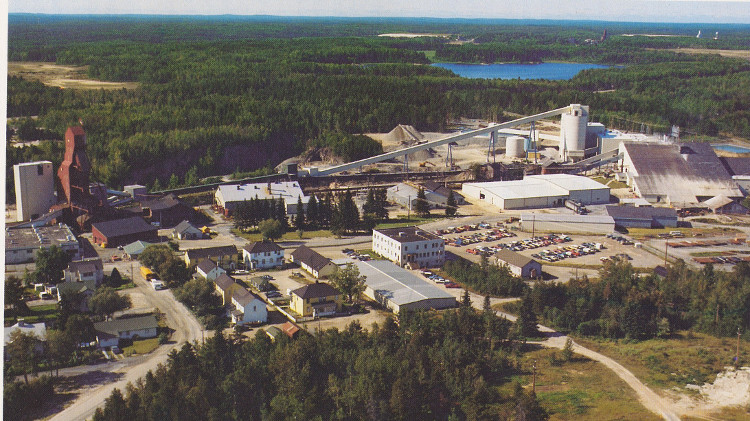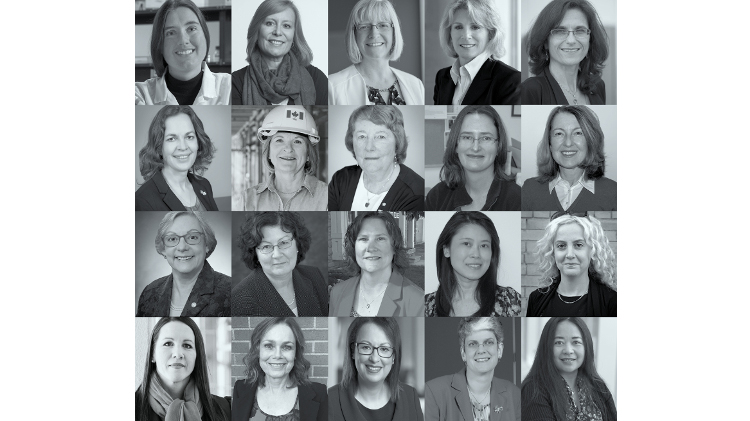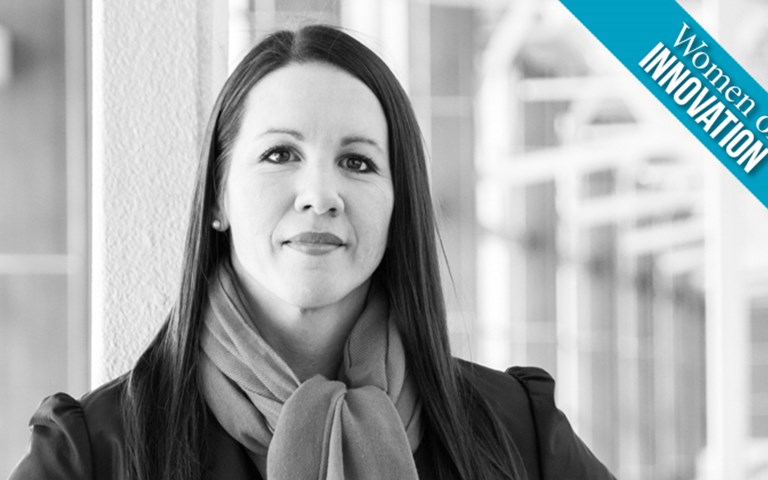Denise Pothier is a chemical engineer at Stantec whose background is in the oil and gas industry. Courtesy of Kimberley Ottenbrite.
Denise Pothier has a background in chemical engineering and more than twenty years of industry experience in the oil and gas sector, working in regulatory compliance, quality assurance and management systems, process engineering, and risk assessment. She is currently the vice president of practice services and the first-ever vice president of Aboriginal relations at Stantec. She is the chair of Stantec’s Aboriginal awareness committee and a member of the company’s diversity and inclusion committee. She sits on the board of directors of Techsploration and the Canadian Council for Aboriginal Business (CCAB). Denise is a champion for marginalized groups and a passionate volunteer in her community.
What factors led to your decision to pursue engineering? I didn’t always know what I was going to be, and until a science teacher mentioned it, I had never considered engineering. To provide some context, I come from a long line of schoolteachers, and I do consider myself an educator at heart — it would have been a natural choice for me to become a teacher. If I had gone into teaching, it would have been as a science or math teacher, things seemingly always circled around sciences. In the end, my parents and I landed on land surveying. My dad said, “We need good land surveyors. You would be great at it.” Then my mom went to a parent-teacher night when I was in grade eleven. My chemistry teacher, M. Philip Doucet, asked my mom what I was thinking about taking at university. She told him land surveying. He said, “Noble profession, but has she ever thought about engineering?” This was back in the day, in a small rural community, not an engineer to be seen. My mom said, “I don’t think so.” She came home and said, “M. Doucet asked if you had ever thought about engineering?” I said, “What’s engineering?” She said, “We’re not sure. We’ll call your uncle.” I had an uncle who was an engineer but who had moved away from home. I didn’t know him and had no idea what he did. Engineering is a very invisible profession, although it impacts everything you touch. We phoned my uncle and he said, “Absolutely. Engineering is great. Are you taking advanced science?” I said, “Yes.” He said, “Okay, absolutely you should go into engineering.” I still had no clue what engineering was, but I thought, “Why not? Sounds interesting.” When I think back to that parent-teacher meeting, I feel so thankful for M. Doucet to have looked beyond the biases and stereotypes, and for introducing the notion of engineering. I am certain that I wouldn’t have pursued a career in engineering had it not been for his suggestion. I am so grateful that my parents and family were also so supportive. This is exactly why it is so natural for me to support an organization such as Techsploration — the impact that they and the teachers involved can have on their students’ futures in so very positive and powerful.
How would you characterize your experience as an undergraduate student? Engineering is demanding. You don’t have time for a lot else, which I think is good because if you’re pressed for time, you learn about time management. Time management is learning what you’re not going to do, as opposed to what you’re going to do. You decide what’s important and that’s what you work on. The other aspect, which isn’t talked about a great deal, is the friendships that are fostered during this period – you have a group of people sharing this experience, working together as a team to help each other succeed. We also had a large class — forty-five people — and about half were international students. That diversity added a wonderful richness to the classroom. I came from a very homogeneous community, and it gave me a strong appreciation of the value of different perspectives.
The other event that will forever stay with me happened during my second year at Dalhousie University: December 6, 1989, when the attack at École Polytechnique happened. Security was heightened. We had to work our way through the shock, the anger, and the fear. A year later a group of my classmates and I organized the first moment of silence in memory of those engineering students.
Can you identify some of the significant turning points in your career? When we were acquired by Stantec, I went from being the quality manager of a homogeneous 200-person firm in Halifax, Nova Scotia, to being the quality manager for a North American organization. To have been given that opportunity was amazing. My sandbox went from something in my backyard to the Sahara Desert. There was this whole wide world. I learned about community development, the mining industry, environmental services, and architecture. Whereas before I had been primarily focused on the oil and gas sector, I now had to learn about all these other business lines and implement a system that would fit this huge organization. Most recently, being appointed Stantec’s first ever vice president of Aboriginal relations has been humbling beyond words. It’s a true honour. It has provided me with the opportunity to learn about that part of my heritage, which wasn’t as prominent as my Acadian heritage growing up.
What are you focusing on in your role as vice president of Aboriginal relations? We’re applying traditional knowledge to business or technical frameworks to enhance them and make them more holistic. That’s very exciting because it resonates with a lot of our employees. It certainly resonates with the communities we are working with. We have a network of community members that we work with across the country, and we look to them for guidance. We will work with elders, the traditional knowledge holders. Much of this knowledge is not written; it’s oral contributions — it really teaches you to listen. What is shared is so valuable. You need to be present when you’re listening because it may be the only moment where you will be blessed or empowered with that teaching and wisdom. The potential for positive impact and real change in this position is huge. This role has allowed me to be my authentic self because it is bringing in that personal aspect that is very important to me. I know I’ve been given the title, but this role is far more than just me. I want to actively participate in the solutions; the water, infrastructure, and housing solutions. It’s the right thing to do. We’re working with communities where we have relationships to see if we can be a partner in improving living conditions. I am working to have Stantec become certified to a Progressive Aboriginal Relations framework. By meeting the intentions of this framework, we will also be meeting many of the “Calls to Action” of the Truth and Reconciliation Commission and the requirements as outlined in the United Nations Declaration on the Rights of Indigenous People. By doing that, we are showing the world that we are a company that can be a trusted community. We’re also partnering with communities to create scholarships. I love the quote by Senator Murray Sinclair, former head of the Truth and Reconciliation Commission: “Education has gotten us into this mess and education is what is going to get us out.” That resonated with me. I talk about education a lot, but it’s more than education, it’s educating yourself, sharing, and collaborating. If we want to be an employer of choice, we have to be viewed as an extension of the communities and as a safe place to come work.
What are you most proud of in your career? Being regarded as an authentic and quiet leader. I first became aware of this when my auditor team recognized me with a managerial award of excellence, which meant the world to me. I’m proud of the fact that I was one of Stantec’s first female engineer vice presidents. Being the first vice president for Aboriginal relations is probably most important to me. The potential for impact in this position is huge.
Why are awards and recognition so important? It is important to be recognized for your contributions. In the corporate world, where women have traditionally been underrepresented, I think it is important to feature women, especially women in engineering to highlight their efforts to make the world a better place. I’m very proud of receiving the women in progress award. To have my daughter, Sabrina, there and my husband and mom and dad and to get to see the impact of my recognition on them, that was equally important to me. The award was a celebration of everything that took me to that point in my career. The evening wasn’t just about me, it was a celebration of their support that made my achievements possible. I’ve watched my peers receive national recognition for their work and efforts and it makes me so proud to call them my friends.
You are a dedicated volunteer. Can you talk about the importance of this work? My mom did a lot of volunteer work and I did a lot of volunteer work with her. Volunteer work is part of my DNA, especially giving back to the community by giving a voice to those who don’t have strong voices. It is very important to me to be a part of the fabric of my community. Growing up, I went through Brownies and Girl Guides, then became a junior leader. That sisterhood, that helping, a lot of volunteer work goes on through that organization. I did a lot of volunteering at school, in the community, and with the Multiple Sclerosis Society. It was always a part of my upbringing. For the past twenty years, I’ve volunteered with Techsploration. I really like helping others be successful. To empower people, you have to make them feel good about themselves, give them a helping hand, and be that icebreaker that will help ease their path. Most recently, I was part of the planning committee for Walking With Our Sisters, an art memorial for missing and murdered women, girls, and two-spirit people; and I volunteered with my husband for a Habitat for Humanity Build for an Indigenous community in Chiapas, Mexico. My daughter and I often volunteer together. I am so proud of her, she, too, finds purpose in giving a voice to those who feel they don’t have a voice.
How do you define yourself as an innovator? An innovator is a practical dreamer; somebody who has ideas — can think outside the box and see things differently — and who is also resourceful. I think I carry these qualities of an innovator. Have I done things in innovative ways? Yes. I think you’ll see a lot of innovation happen in my role as vice president of Aboriginal relations. The idea to apply traditional knowledge to business and engineering frameworks was innovative.
How can we increase the participation of women in engineering? If girls and young women see women that remind them of themselves or somebody who they can connect with — an aunt or a next-door neighbour — then they might say, “I can see myself doing that.” We also need to return to the calling of an engineer, to convey the message that engineering is about making the world a better place. Engineering is all about social justice, about the societal and environmental benefits. It’s not just about building a bridge or car, it’s the impact and benefit of those things on humanity that will resonate with girls and young women. The bridge brings safe passage, food to an isolated community, and is built in such a way that it protects the waterway. Young people want to be the change in the world; they want to make the world a better place. If we show them that engineering can help effect that change, then I think we will be able to engage more young women and more young people in general.
What advice would you give to a young woman considering a career in engineering? Go for it. My career has served me well, it has served my family well, and it has served my community well.
To read more about Denise and the other Women of Innovation, purchase the book here.
Next: Elizabeth Croft brings women in STEM together
Croft recognizes and fights to dispel the implicit biases that continue to plague women in STEM




